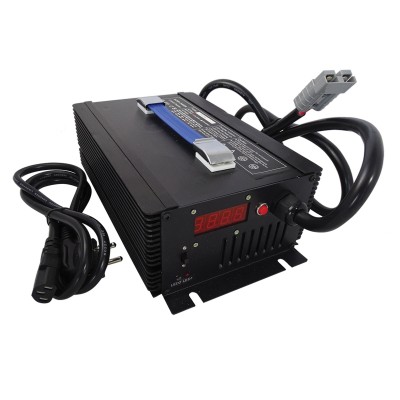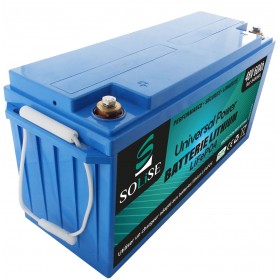Lithium Iron Phosphate (LifePO4) 48V 20A battery charger.
The indicator light is green when the charger is connected. As soon as the battery is connected, the indicator turns red and then green again when the battery is charged. It has an Anderson PP30 output socket compatible with the SOLISE battery connector.
TECHNICAL SPECIFICATIONS
Input voltage : 180 to 240V AC 50/60Hz
Charging voltage : 57.6V +/- 0.2VDC
Minimum load voltage : 40VDC
Output current : 20A +/- 10%
No-load power : <0.5W
Efficiency : 85% at rated current
Operating temperature : -29°C to 45°C
Storage temperature : -40°C to 75°C
Dimensions : 282(L)x123(W)x120(H)mm
Weight : 6.5kg
This charger has a switch, a power indicator and a battery charge indicator. Forced convection by fan.
It switches off automatically when the battery is fully charged. This charger has a switchable voltage/current display.
PROTECTION
- Reset by mains cut-off
- Reverse polarity protection
- Mains protection circuit breaker
- Only starts if a battery is connected
STANDARDS
Certifications : RoHS I CE
Warranty - 1 year
RECOMMENDATIONS FOR USING SOLISE LITHIUM CHARGERS
To ensure optimum, safe performance and optimise the service life of your SOLISE lithium chargers, we recommend that you follow these guidelines :
- Charging time : Do not leave the charger connected to the battery for more than 72 hours.
- Electrical safety : Do not dismantle the appliance. There is a risk of electric shock if the internal components are handled incorrectly.
- Exposure to water : Do not expose the charger to falling water or immerse it. Water can cause short circuits and irreversible damage to the charger.
- Battery compatibility : Only connect lithium batteries suitable for either LiFePO4 or NMC technology to this charger. Using non-compatible batteries may lead to malfunctions or safety risks.
- Correct polarity : Make sure you observe the correct polarity when connecting the battery to the charger.
RECYCLING OF CHARGERS USES
These products should not be thrown in the bin. You can return them to dedicated collection points, such as waste collection centres, supermarkets or DIY shops, so that they can be recycled in an appropriate and environmentally-friendly way.







